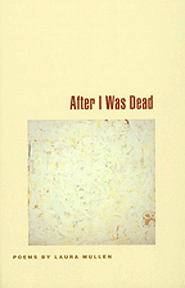Laura Mullen was born in Los Angeles in 1958. She received her MFA from the Iowa Writers Workshop and currently teaches at Colorado State University in Fort Collins. She is the author of The Surface (University of Illinois, 1991) and After I Was Dead (University of Georgia, 1999). Her writing has won many awards including a fellowship from the National Endowment for the Arts.

The following is an excerpt from an interview with Mullen that will appear in Range of the Possible: Conversations with Contemporary Poets by Tod Marshall, forthcoming from Eastern Washington University Press in May.
Tod Marshall: You're someone who's bridged the life-of-the-writer with life-of-the-teacher. Can you talk about the relationship between that profession and your work? Have you found it a career that you can balance well with the writing?
Laura Mullen: I think it's varied from moment to moment and from place to place. It's easier with smaller classes; it's harder with larger classes. But those are the obvious points.
TM: What about something along the notion that Donald Hall might write; you know, that teachers of poetry are sort of damning themselves because they're reading the work of juveniles all the time.
LM: Oh. That seems absurd. No. I'm actually working right now-we'll see how far the project goes-but I'm doing some collaborating right now with one of my graduate students. I'm finding it immensely freeing. We've written three things so far; I think we'll go at least a little further. I feel, the Donald Hall quote, the problem with it is, again, being shut down. If you're not paying attention, well then of course you'll merely feel as if you're seeing the same thing over and over again, and in some cases, God knows, you might be. But on the other hand, if you are awake and alive and open to new energies, then interacting with very young writers can be extremely helpful. Beginner's luck, that's the cliche that comes to mind: they don't necessarily know yet "what's right," and "what's wrong," and the ways they don't know that, haven't absorbed that, haven't shut themselves down, can be helpful to you.
TM: Something that has had a great deal of impact on many writers in the late twentieth century is the influx of, and emphasis upon-in literary studies-literary theory. Can you talk about how reading literary theory has affected your poetry?
LM: There's always theory, whether or not you acknowledge it. So, for me, it's helpful to become aware of and read it. And I find it very freeing, someone like Roland Barthes, who was writing a densely poetic text, or Derrida: They're extremely useful to me, as a writer, in terms of their formal experiments and willingness to shift away from the work to the text-you can see how, given my fear of time and my desire for perfection, that's a freeing move.
TM: It seems to me that in your newer book there are more longer pieces, where you're exploring the longer poem. Can you talk about your attraction to the long poem?
LM: My first answer is-the lyric is like an affair. The longer thing, the book-length thing, is like a marriage. You get up every morning and you know what you're doing, as versus, having to meet in cheap hotels and hoping it all works out. So, I like the long form...There's less separation between art and life. In the longer work: More can come in.
TM: So that notion of letting things into the poem is very significant.
LM: Letting things in-making a space large enough to recognize more than you might have recognized. I adore the lyric, but part of what I adore about it is its feeling of constraint, the feeling of how much has to go, to be shucked away, in order to make it intense enough. But I love the long poem for how much can come in, and how much can be recognized and included by the space poetry opens.








